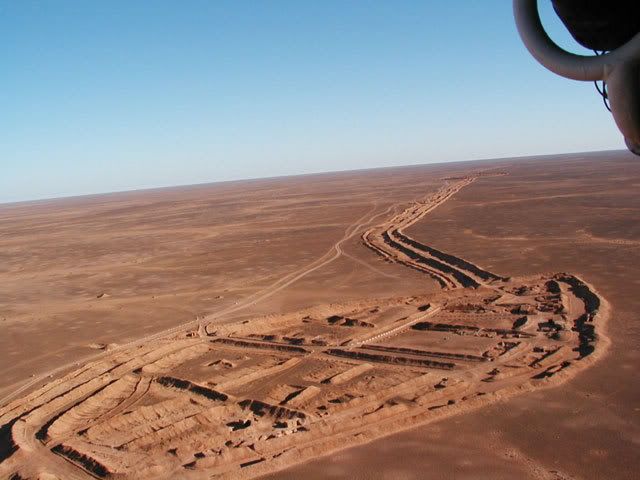 A third international shipping company has bowed to pressure in the last week to quit economic activity in ports in occupied Western Sahara. A Hong Kong-based company Jinhui Shipping has followed two Norwegian companies Arnesen Shipbrokers and R-Bulk, which stopped shipping out phosphates from the territory last year. All three have stopped their exports after pressure from Pro-Sahrawi groups and more companies are expected to follow. This sophisticated pressure is being brought to bear worldwide with spokesman Malainan Lakhal currently in Australia to promote the anti-Moroccan phosphate cause.
A third international shipping company has bowed to pressure in the last week to quit economic activity in ports in occupied Western Sahara. A Hong Kong-based company Jinhui Shipping has followed two Norwegian companies Arnesen Shipbrokers and R-Bulk, which stopped shipping out phosphates from the territory last year. All three have stopped their exports after pressure from Pro-Sahrawi groups and more companies are expected to follow. This sophisticated pressure is being brought to bear worldwide with spokesman Malainan Lakhal currently in Australia to promote the anti-Moroccan phosphate cause. Western Sahara is a small barren North-African nation on the Atlantic coast, bordered by Algeria, Mauritania and Morocco. It is also the last colony in Africa. The country has been in political limbo since 1976. The independence group Polisario fought a war with Morocco until a 1991 ceasefire. Since then, the country’s Sahrawi population have been waiting for a UN-sponsored referendum to allow them to vote for either independence or continued integration with Morocco. However with Morocco considered an important ally of the US because of its cooperation in fighting terrorism and its generally pro-West policies, the Sahrawis may be waiting a while.
Western Sahara was a former Spanish colony known as Spanish Sahara. After Spain withdrew when Franco died, it was invaded by Morocco with the implicit support of the US in 1976. Today Morocco illegally earns billions of dollars each year from the rich fishing off the coast and as well as inheriting Spain’s interests in phosphate. It also continues to rely on US support to hose down any nasty UN Security Council resolutions forcing them to comply with the referendum request.
Phosphate mining began under the Spanish administration in the 1950s and was responsible for bringing many nomadic Sahrawis into the sedentary life of towns. In 1976 the International Court of Justice found overwhelming support for Polisario and ruled that the people of Western Sahara had a right to determine their own future. But when Morocco invaded despite the ruling, the majority of the population fled across the borders ahead of Moroccan attacks. The local population are called “Ahel es-Sahel” or Sahrawi people and are a mix of Berber, Bedouin and black African tribes.
Almost a quarter of the population (over 80,000 people) still live in refugee camps in neighbouring Algeria. Those that remain in Western Sahara are subject to Moroccan law. In Morocco, both the law and tradition prohibit criticism on three topics: the monarch; the sanctity of Islam; and Morocco's claim to the Western Sahara. Security surveillance is tight and harassment of domestic and foreign human rights workers is common. Police also routinely repress public protest using excessive force against demonstrators, some of whom threw rocks and Molotov cocktails.
Morocco is the world’s leading exporter of phosphates which are used in the fertilising industry. Through internal and Western Saharan mines, it controls an estimated 75 per cent of the world market. Their exporting process was greatly facilitated by a Free Trade Agreement with the US in 2004 (though the US explicitly excluded Western Sahara from the FTA). But with Morocco signing partnerships with several North American mining companies such as Canadian firms PCS and Agrium, and US-based Mosaic, Agrifos and Innophos, there is strong commercial pressure to support the Moroccan presence in the colony.
 Last week, an UN envoy for the territory delivered a blow to Polisario supporters when he said that the Moroccan presence would not be ending any time soon. The UN mediator for the territory, Peter van Walsum, told the Security Council that independence was unrealistic. Van Walsum had concluded “there was no pressure on Morocco to abandon its claim of sovereignty over the territory and, therefore, that an independent Western Sahara was not a realistic proposition." Van Walsum, a Dutch diplomat, later said his comments were a "gamble" to break the negotiating logjam. But the only player happy with his gamble was Morocco. As Reuters point out, van Walsum’s gamble was a recognition of a diplomatic reality – “that Rabat can and will reject independence as long as its control has the quiet backing of big powers like the United States and France.”
Last week, an UN envoy for the territory delivered a blow to Polisario supporters when he said that the Moroccan presence would not be ending any time soon. The UN mediator for the territory, Peter van Walsum, told the Security Council that independence was unrealistic. Van Walsum had concluded “there was no pressure on Morocco to abandon its claim of sovereignty over the territory and, therefore, that an independent Western Sahara was not a realistic proposition." Van Walsum, a Dutch diplomat, later said his comments were a "gamble" to break the negotiating logjam. But the only player happy with his gamble was Morocco. As Reuters point out, van Walsum’s gamble was a recognition of a diplomatic reality – “that Rabat can and will reject independence as long as its control has the quiet backing of big powers like the United States and France.”
1 comment:
Hi, I'm doing a scientific paper about phosphates in Western Sahara and resource conflitcs there. Would you mind if you tell me what were your sources for this article?
Filip Gajdosik
(Czech Republic)
Post a Comment